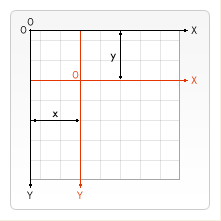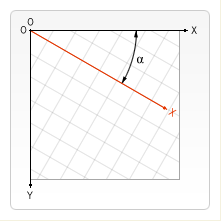Canvas 变形
Canvas 变形
状态的保存和恢复 Saving and restoring state
save(): 通过将当前状态放入栈中,保存 canvas 全部状态的方法。保存到栈中的绘制状态有下面部分组成:- 当前的变换矩阵。
- 当前的剪切区域。
- 当前的虚线列表.
- 以下属性当前的值:
strokeStyle,fillStyle,globalAlpha,lineWidth,lineCap,lineJoin,miterLimit,lineDashOffset,shadowOffsetX,shadowOffsetY,shadowBlur,shadowColor,globalCompositeOperation,font,textAlign,textBaseline,direction,imageSmoothingEnabled
restore(): 恢复画布(canvas)状态。在绘图状态栈中弹出顶端的状态,将 canvas 恢复到最近的保存状态的方法。如果没有保存状态,此方法不做任何改变。
<canvas id="drawSaveRestoreCanvas"></canvas>function draw() {
var ctx = document.getElementById('drawSaveRestoreCanvas').getContext('2d');
ctx.fillRect(0, 0, 150, 150); // 使用默认设置绘制一个矩形
ctx.save(); // 保存默认状态
ctx.fillStyle = '#09F'; // 在原有配置基础上对颜色做改变
ctx.fillRect(15, 15, 120, 120); // 使用新的设置绘制一个矩形
ctx.save(); // 保存当前状态
ctx.fillStyle = '#FFF'; // 再次改变颜色配置
ctx.globalAlpha = 0.5;
ctx.fillRect(30, 30, 90, 90); // 使用新的配置绘制一个矩形
// 第一次调用 restore ,状态栈中最后的状态会弹出,并恢复所有设置。
ctx.restore(); // 重新加载之前的颜色状态
ctx.fillRect(45, 45, 60, 60); // 使用上一次的配置绘制一个矩形
// 第二次调用 restore ,已经恢复到最初的状态,则绘制出一个黑色的四方形
ctx.restore(); // 加载默认颜色配置
ctx.fillRect(60, 60, 30, 30); // 使用加载的配置绘制一个矩形
}
draw()移动 Translating
translate(x, y) : 通过移动 canvas 和它的原点到一个不同的位置。实际开发常用于改变其他变换方法的变换中心点。
x: 水平方向的移动距离。y: 垂直方向的移动距离。

<canvas id="drawTranslatingCanvas"></canvas>function draw() {
var ctx = document.getElementById('drawTranslatingCanvas').getContext('2d');
for (var i = 0; i < 3; i++) {
for (var j = 0; j < 3; j++) {
ctx.save();
ctx.fillStyle = 'rgb(' + 51 * i + ', ' + (255 - 51 * i) + ', 255)';
ctx.translate(10 + j * 50, 10 + i * 50);
ctx.fillRect(0, 0, 25, 25);
ctx.restore();
}
}
}
draw()旋转 Rotating
rotate(angle) : 以原点为中心旋转 canvas。默认旋转中心点为 canvas 的原点 (0, 0) 坐标点。如果需要改变,可以使用 translate() 方法进行调整。
angle: 旋转的角度 angle ,顺时针方向旋转,以弧度为单位的值。计算公式 :degree * Math.PI / 180。例如,旋转 45°,旋转弧度就是45 * Math.PI / 180。

<canvas id="drawRotatingCanvas"></canvas>function draw() {
var ctx = document.getElementById('drawRotatingCanvas').getContext('2d');
ctx.translate(75, 75);
for (var i = 1; i < 6; i++) {
ctx.save();
ctx.fillStyle = 'rgb(' + 51 * i + ',' + (255 - 51 * i) + ',255)';
for (var j = 0; j < i * 6; j++) {
ctx.rotate((Math.PI * 2) / (i * 6));
ctx.beginPath();
ctx.arc(0, i * 12.5, 5, 0, Math.PI * 2, true);
ctx.fill();
}
ctx.restore();
}
}
draw()缩放 Scaling
scale(x, y) : 根据 x 水平方向和 y 垂直方向,为 canvas 单位添加缩放变换的方法。默认缩放中心点为 canvas 的原点 (0, 0) 坐标点。如果需要改变,可以使用 translate() 方法进行调整。
x: 水平方向的缩放因子。y: 垂直方向的缩放因子。
画布初始情况下, 是以左上角坐标为原点的第一象限。如果参数为负实数,相当于以 x 或 y 轴作为对称轴镜像反转。(例如,使用 translate(0, canvas.height); scale(1, -1); 以y轴作为对称轴镜像反转,就可得到著名的笛卡尔坐标系,左下角为原点)。
<canvas id="drawScalingCanvas"></canvas>function draw() {
var ctx = document.getElementById('drawScalingCanvas').getContext('2d');
ctx.save();
ctx.scale(10, 3);
ctx.fillRect(1, 10, 10, 10);
ctx.restore();
ctx.scale(-1, 1);
ctx.font = '48px serif';
ctx.fillText('MDN', -135, 120);
}
draw()变形 Transforms
transform(a, b, c, d, e, f): 使用矩阵**多次叠加(累加)**当前变换的方法。可以缩放、旋转、移动和倾斜上下文。将当前的变形矩阵乘上一个基于自身参数的矩阵a (m11): 水平缩放。b (m12): 垂直倾斜。c (m21): 水平倾斜。d (m22): 垂直缩放。e (dx): 水平移动。f (dy): 垂直移动。
a - f参数对应的变换矩阵描述为: $\left[ \begin{array}{ccc} a & c & e \ b & d & f \ 0 & 0 & 1 \end{array} \right ]$setTransform(a, b, c, d, e, f): 使用单位矩阵**重新设置(覆盖)**当前的变换并调用变换的方法a (m11): 水平缩放。b (m12): 垂直倾斜。c (m21): 水平倾斜。d (m22): 垂直缩放。e (dx): 水平移动。f (dy): 垂直移动。
a - f参数对应的变换矩阵描述为: $\left[ \begin{array}{ccc} a & c & e \ b & d & f \ 0 & 0 & 1 \end{array} \right ]$resetTransform(): 重置当前变形为单位矩阵,它和调用以下语句是一样的:ctx.setTransform(1, 0, 0, 1, 0, 0)
<canvas id="drawTransformsCanvas" width="300" height="280"></canvas>function draw() {
var ctx = document.getElementById('drawTransformsCanvas').getContext('2d');
var sin = Math.sin(Math.PI / 6);
var cos = Math.cos(Math.PI / 6);
ctx.translate(100, 100);
var c = 0;
for (var i = 0; i <= 12; i++) {
c = Math.floor((255 / 12) * i);
ctx.fillStyle = 'rgb(' + c + ',' + c + ',' + c + ')';
ctx.fillRect(0, 0, 100, 10);
ctx.transform(cos, sin, -sin, cos, 0, 0);
}
ctx.setTransform(-1, 0, 0, 1, 100, 100);
ctx.fillStyle = 'rgba(255, 128, 255, 0.5)';
ctx.fillRect(0, 50, 100, 100);
}
draw()